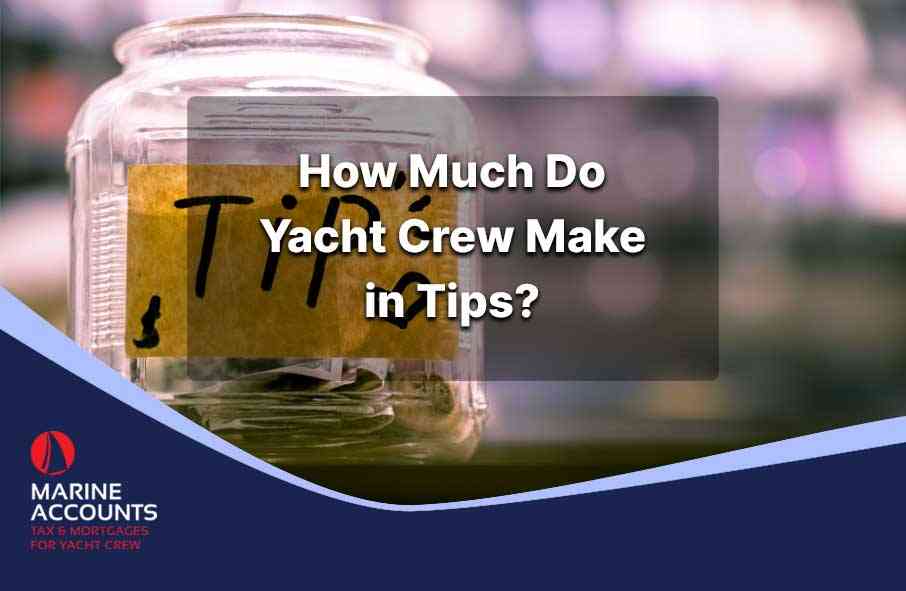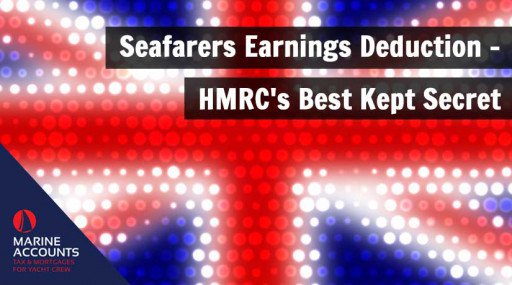Receiving tips in any line of work is a motivating and rewarding aspect of any job.
In the case of yacht crew, tips can greatly add to what is already a generous basic salary.
But how much do yachties typically receive as tips from guests aboard superyachts?
We take a look below.
- What Crew Members Does a Yacht Typically Have?
- Do Yacht Crew Receive a Salary?
- Do Yacht Crew Receive Tips?
- How Much Do Yacht Crew Make?
- Is It Customary to Tip Yacht Crew?
- How Much Do Charter Yacht Crew Make in Tips?
- How Much Do Private Yacht Crew Make in Tips?
- Is Yacht Crew Income Taxable?
- Should I Declare My Income to HMRC?
- Conclusion
What Crew Members Does a Yacht Typically Have?
The number and type of crew members on a yacht depend largely on its size.
Every yacht has a captain and usually one or more stewards or deckhands. Larger yachts will also employ engineers, chefs, and additional deck or interior crew.
Do Yacht Crew Receive a Salary?

Yes. Yacht crew are paid a monthly salary, and on charter yachts they often receive additional income from guest tips.
The average salary for a deckhand or junior stewardess typically ranges between £2,000 and £2,700 per month, depending on the yacht’s size and type.
Private yachts often include better leave packages, while charter yachts can provide higher total earnings through tips.
Do Yacht Crew Receive Tips?
Charter clients frequently give tips to show appreciation for exceptional service. The happier and more comfortable the guests are, the more generous the gratuity tends to be.
Professionalism, friendliness, and teamwork are key factors that influence how much each crew member receives.
How Much Do Yacht Crew Make?
On a one-week charter, crew can expect tips ranging from 5% to 15% of the total charter fee. The industry standard is around 10%.
Guests usually hand this amount to the captain, who then distributes it fairly among the crew based on rank and performance.
| Position | 20–40m Yacht | 40–60m Yacht | 60m+ Yacht | 80m+ Yacht |
|---|---|---|---|---|
| Captain | €4,000–€10,000 | €7,000–€16,000 | €14,000+ | €16,000+ |
| 1st Officer | €3,000–€5,000 | €4,300–€5,700 | €6,000+ | €7,000+ |
| Bosun | €2,800–€3,200 | €3,200–€4,500 | €4,000+ | €5,000+ |
| Chief Stewardess | €3,000–€4,500 | €4,000–€6,000 | €6,000+ | €7,000+ |
| Senior Stewardess | €2,800–€3,000 | €2,800–€3,500 | €3,500+ | €4,500+ |
| Senior Deckhand | €2,800–€3,500 | €2,800–€4,000 | €3,500+ | €4,500+ |
| Junior Stewardess | €2,000–€3,000 | €2,000–€3,000 | €3,000+ | €3,000+ |
| Junior Deckhand | €2,000–€3,000 | €2,000–€3,000 | €3,000+ | €3,000+ |
| Chef | €3,000–€4,500 | €4,000–€7,000 | €6,000+ | €7,500+ |
Is It Customary to Tip Yacht Crew?
Yes, on charter yachts it is standard practice to tip the crew around 10% of the charter fee. Private yacht owners, however, may offer gifts or bonuses instead of cash gratuities.
How Much Do Charter Yacht Crew Make in Tips?

Tips are one of the biggest financial incentives for charter yacht crew. A junior deckhand earning £2,000 per month could easily earn an additional £25,000 per year in tips if working multiple charters.
If eligible for the Seafarers Earnings Deduction, that income can be tax-free for UK residents who meet the criteria.
How Much Do Private Yacht Crew Make in Tips?
Private yacht crew rarely receive tips. Instead, owners may show appreciation through end-of-season bonuses or paid trips. However, private yachts often offer more generous leave allowances — sometimes up to 120 days per year.
Is Yacht Crew Income Taxable?
Many yacht crew mistakenly believe they do not need to declare their income, but UK residents working at sea are still subject to HMRC rules. Fortunately, qualifying seafarers may claim 100% exemption under the Seafarers Earnings Deduction (SED).
To qualify, crew must:
Be employed aboard a ship
The vessel must be capable of navigation and undertake voyages beginning or ending outside the UK.
Visit at least one foreign port
Each period of employment must include a voyage that calls at a foreign port.
Fulfil the qualifying period
Seafarers must spend at least 183 days outside the UK in any 365-day period. Time away from the UK at midnight counts as a day of absence.
Domestic income remains taxable, but the personal tax-free allowance (£12,570 for 2023/24) still applies.
Should I Declare My Income to HMRC?

Yes. Even if no tax is due, all income should be declared to HMRC to remain compliant and ensure eligibility for the Seafarers Earnings Deduction. Failure to report income can result in penalties or investigations.
Conclusion
Tips and tax exemptions can make yachting a lucrative career path. By understanding how salaries, gratuities, and HMRC rules work, crew can maximise their income legally and efficiently.
If you have questions about getting into yachting or need help with tax consultation, our team is here to help.
Disclaimer: Any advice in this publication is not intended or written by Marine Accounts to be used by a client or entity for the purpose of (i) avoiding penalties that may be imposed on any taxpayer or (ii) promoting, marketing or recommending to another party matters herein.








